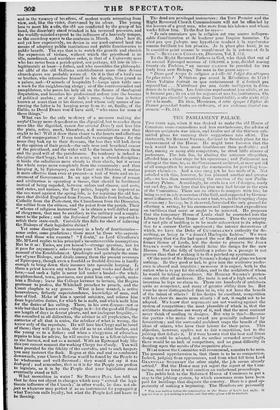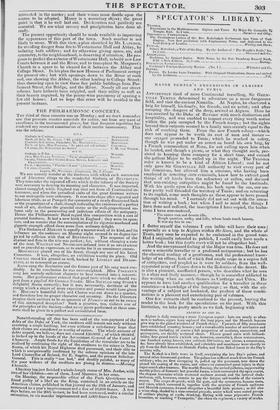THE PARLIAMENT PALACE.
Two years ago, when it was desired to make the old House of Commons more commodious and less unwholesome, the advice of thirteen architects was taken, and twelve out of the thirteen sub- mitted plans for carrying their suggestions into efket. The thirteenth, Sir ROBERT SMIRKE, declined to furnish plans for the improvement of the House. Ile might have foreseen that the task would have been more troublesome than profitable; and that, among so many able competitors, he stood little chance of preference. The late fire. by abating the nuisance altogether, afforded him a clear stage for his operations ; and Parliament not sitting at the time, he, as the Government architect,at once eot rid of all competition by securing the commission for providing tem- porary chambers. And a nice snug job he has made of it.. Not satisfied with this, however, he lots planned another and greater job,—no less than monopolizing the erection of the BeW Parlia- mentary- Palace. Accordingly, he sends in a set cf designs, ready cut and dry, in the hope that his plan may find favour in the eyes of the Committee. There are no others to compare with his; he being as yet in sole possession of the field, and supported by Govern- ment influence. He has throw e out a bait, too, in the tempting shape of economy ; haviug, be it observed, furnished the only ground for effecting a saving, by his enormous and improvident expenditure on buildings that must or might to be removed. He proposes that time temporary House of Lords shall be converted into the Library for the future House of Commons. Thus the symmetry of a vast pile of building is to be made subservient to its adapta- tion to a narrow Gothic apartment; the interior decorations of which, we have the Duke of CUMBERLAND'S authority for de- scribing, as being in " a damn'd Harlequin fashion." We were regretting that the fire had spared the new Royal entrance to the former House of Lords, lest the desire to preserve Sir Jones Swore's costly vestibule should fetter the design for the new Houses. But the folly of building a palace to a passage is not greater than that of making it to fit a patched-up apartment.
Of the merit of Sir ROBERT SMIRKE'S design and plans we know nothing. Be they good or bad, to give him the exclusive prefer- ence is absurd and impolitic : moreover it is unjust, both to the nation who is to pay for the edifice, and to the architects of whom he would be taking precedence. Sir ROBERT SMIRKE'S preten- sions are after all mediocre. His taste is not of a high order, and invention he lays no claim to. There are hundreds of architects quite as competent, and many of greater ability than he. But were he more distinguished than he is, why not have the benefit of the talent of others ? If his design be excellent, competition will but show its merits more clearly : if not, it ought not to be adopted. We know that arguments are not wanting against the system of competition; the most plausible of which is, that the architects themselves are weary of it, and that the most eminent never think of sending in designs. But why is this?—Because the parties who make the award arc generally influenced by favouritism ; and the successful architect reaps the benefit of the ideas of others, who have their labour for their pains. This objection, however, applies not to fair cempetition, but to the jobbing that defeats it. If it were known that the best and fittest design would be adopted, and its author rewarded accordingly, there would be no lack of competitors, and no great difficulty in deciding upon the merits of the respective plans. IV hat course the Committee will recommend, remains to be seen. The general apprehension is, that there is to be no competition. Indeed, judging from appearances, and from what MI from Lord GRANVILLE SOMERSET the other night, the job seems already settled.* But the House may yet reject the report of the Com- mittee, and we trust it will sanction no underhand proceedings. The public look to the Reformed House of Commons to put a stop to the jobbing system, by which enormous sums have been paid for buildings that disgrace the country. Here is a good op- portunity of making a beginning. The Members are personally
• This was written before the ennversatiiin in the llonso of Loris last night. it appiiars Oat a- yet nothing is stttled, and that other Flails IL be recaved.
interested in the matter; and their voices must decide upon the course to be adopted. Money is a secondary object ; the great point is that it be well laid out. Dehbaration and publicity are essential. We see what secrecy and precipitation have done al- ready.
The present opportunity should be made available to improving the appearance of this part of the town. Such another is not likely to occur. With this view, a plan sketched by Mr. LAPI DOE, for avoiding danger from fire to Westminster Hall and Abbey, by isolating both edifices; and for otherwise giving space, air, and symmetry, to the neighbourhood, is deserving I attention. He pro- poses to perfect the exterior of Westminster Hall, to build new Law Courts between it and the River, and to transplant St. Margaret's Church to a space to be cleared for it between the Abbey and College Street. In his plan the new Houses of Parliament occupy the present site; but with openings down to the River at each end, one showing the Abbey, the other leading to College Street; thus throwing open to view these fine public buildings from Par- liament Street, the Bridge, and the River. Nearly all our street reforms have hitherto been crippled, and their utility as well as their beauty impaired, by the penny-wise parsimony of sparing a few old houses. Let us hope this error will be avoided in the present instance.



























 Previous page
Previous page